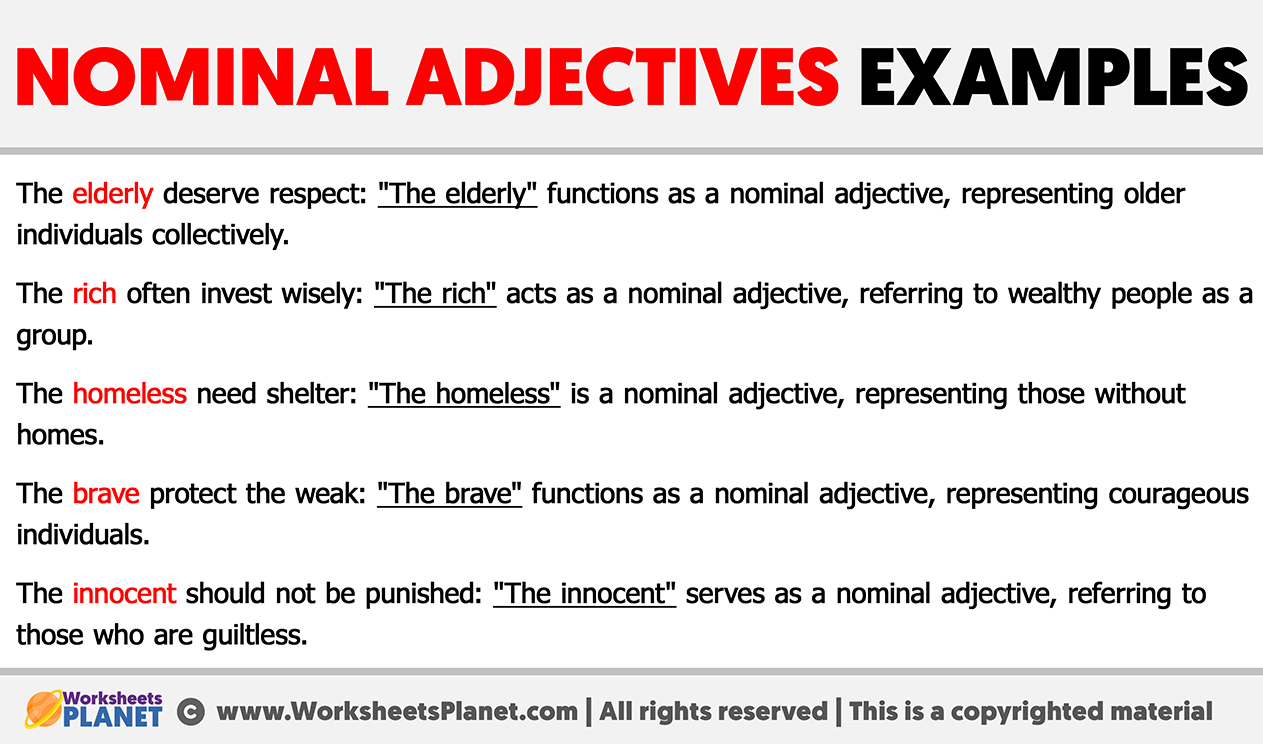Nominal adjectives are adjectives that function as nouns or substitute for nouns, often referring to groups of people, things, or concepts.
They typically don’t modify nouns directly but serve as placeholders for nouns.

Some sentences using nominal adjetives (with explanation)
- The homeless need our support. (Nominal adjective: “homeless” substitutes for “homeless people” to refer to a group of individuals experiencing homelessness.)
- The young are our future. (Nominal adjective: “young” refers to young people collectively without specifying a particular age group.)
- The elderly often face health challenges. (Nominal adjective: “elderly” represents older individuals as a general category.)
- The rich enjoy certain privileges. (Nominal adjective: “rich” stands for wealthy people, avoiding repetition.)
- The poor deserve access to basic necessities. (Nominal adjective: “poor” refers to those in poverty.)
- The educated tend to have more opportunities. (Nominal adjective: “educated” denotes people with formal education.)
- The unemployed struggle to make ends meet. (Nominal adjective: “unemployed” represents those without jobs.)
- The sick should seek medical attention. (Nominal adjective: “sick” stands for people who are unwell.)
- The talented often rise to the top. (Nominal adjective: “talented” refers to those with exceptional abilities.)
- The brave defend their beliefs. (Nominal adjective: “brave” represents courageous individuals.)
- The marginalized need advocacy and support. (Nominal adjective: “marginalized” stands for disadvantaged or underrepresented groups.)
- The incarcerated deserve rehabilitation. (Nominal adjective: “incarcerated” represents people in prison.)
- The unemployed face financial uncertainty. (Nominal adjective: “unemployed” avoids repeating “unemployed individuals.”)
- The homeless require shelter and food. (Nominal adjective: “homeless” refers to those without a permanent residence.)
- The elderly often have valuable life experiences. (Nominal adjective: “elderly” denotes older individuals collectively.)
- The oppressed seek justice and equality. (Nominal adjective: “oppressed” represents those facing systemic injustices.)
- The creative thrive in artistic pursuits. (Nominal adjective: “creative” stands for imaginative individuals.)
- The disabled face unique challenges. (Nominal adjective: “disabled” refers to individuals with disabilities.)
- The employed contribute to the workforce. (Nominal adjective: “employed” represents those with jobs.)
- The fortunate should help those in need. (Nominal adjective: “fortunate” denotes people who have experienced good luck or success.)

